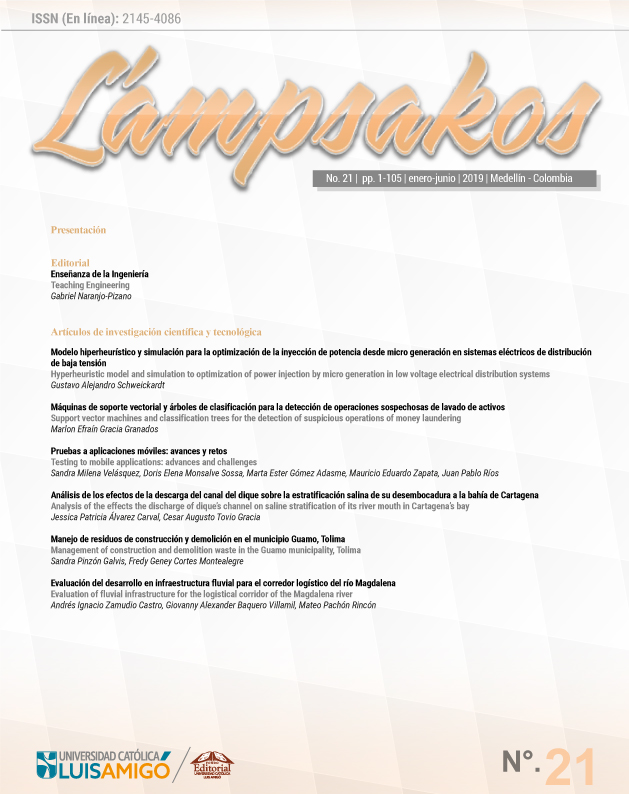Evaluation of the development in fluvial infrastructure for the logistical corridor of the magdalena river
DOI:
https://doi.org/10.21501/21454086.2691Keywords:
Fluvial mode, Logistics, Multimodal, Fluvial infrastructure, Magdalena river, TransportAbstract
River development is one of the aspects that is in the public eye when talking about logistics development of the country. Unused for years, fluvial transport allows high load capacity, it is economical, its environmental impact is low and it has great capacity for multimodal integration. For all these reasons, this article presents an evaluation of the infrastructure development that the logistics corridor of Magdalena River has had in the last 18 years, beginning in 2000; it covers the proposals that have been made to encourage and strengthen the development of logistics operations carried out along the river. The methodological exercise involves a description of the investment in development and infrastructure made to the ports of the logistics corridor under study, among them Puerto Salgar in Cundinamarca department, and the exit of the tributary in Barranquilla’s port. It also includes the current situation of the operations made in the corridor, as well as in the corridors that are being studied by governmental entities with the purpose of being intervened in accordance with the restrictions that the tributary presents. After displaying the information regarding to infrastructure, a description of the investment plans, development and implementation of the plans will be presented. Finally, the conclusion will expose a general approach to the situation of the river that allows to begin taking into consideration some elements to help the development of the corridor in the future.Downloads
References
G. Liedtke, “Principles of micro-behavior commodity transport modeling”, Transportation Research Part E: Logistics and Transportation Review, vol. 45, no. 5, pp. 795-809, 2009. DOI: https://doi.org/10.1016/j.tre.2008.07.002
Ministerio de Transporte, Decreto número 2079 de 2010, Bogotá D.C., 2010.
J. Allen, G. Tanner, M. Browne, S. Anderson, G. Christodoulou and P. Jones, “Modelling Policy Measures and Company Initiatives for Sustainable Urban Distribution”, University of Westminster, 2003.
Departamento Nacional de Planeación, “Seguimiento al Conpes 3547 del 27 de octubre de 2008: política nacional logística”, Conpes 3568, Bogotá D.C., 2009.
Departamento Nacional de Planeación, “Política Nacional Logística”, Conpes 3547, Bogotá D.C., 2008.
Consejo Privado de Competitividad, “Informe nacional de competitividad”, Bogotá: Puntoaparte, 2014.
Departamento Nacional de Planeación, “Plan para restablecer la navegabilidad del río Magdalena”, Conpes 3758, Bogotá D.C., 2013.
M. D. Arango Serna et al. Sistema Logístico Nacional de Carga Colombiano. Colombia: Universidad Nacional de Colombia, 2012.
Departamento Nacional de Planeación, “Política nacional de transporte público auomotor de carga”, Conpes 3489, Bogotá D.C., 2007.
C. Barnhart and G. Laporte, Eds., Handbooks in operations research and management science: Transportation. Cambridge Massachusetts: North-Holland, 2007.
G. De Jong, H. Gunn and W. Walker “National and international freight transport models: An overview and ideas for future development”, Transport Reviews vol. 24, no. 1, pp. 103-124, 2004. DOI: https://doi.org/10.1080/0144164032000080494
E. Miller-Hooks, L. Chen, R. Nair and H. Mahmassani, “Security and Mobility of Intermodal Freight Networks”, Transportation Research Record: Journal of the Transportation Research Board, pp. 109-117, 2009. DOI: https://doi.org/10.3141/2137-12
Museo Nacional de Colombia, Río Magdalena Navegando por una Nación, 2da edición, Bogotá: Museo Nacional de Colombia, 2010.
Cámara Colombiana de Infraestructura, “Seguimiento a proyectos de infraestructura, informe dirección técnica, transporte fluvial: río Magdalena-Canal del Dique”, Bogotá D.C.: CCI, 2008.
Fluidis, Cormagdalena, “Plan de manejo de la cuenca del río Magdalena-Cauca”, CORMAGDALENA, 2017.
P. R. Fornaguera, “Plan de Inversiones en Infraestructura de transporte”, Documentos Ministerio de Transporte, 2010.
Cormagdalena, “Adecuación de los Principales Puertos del río Magdalena”, 2002.
ASOPORTUARIA, Modelos de optimización de costos de transporte intermodal en el río Magdalena, ASOPORTUARIA, 2013.
Congreso de Colombia, “Ley 1508 de 2012”, Diario Oficial 48308, Bogotá D.C., 2012.
Naviera Fluvial Colombiana S.A., “Transporte intermodal de carga por el río Magdalena” en Foro de Logística de Graneles Sólidos, Naviera Fluvial Colombiana S.A., 2009.
Ministerio de transporte, “Metodologías tarifarias del transporte fluvial en Colombia. Análisis conceptual”, Bogotá D.C., 2006.
U.S. Department of Homeland Security, “Coast Guard Navigation Standards Manual”, Washington, DC, 2016. Retrieved from https://media.defense.gov/2017/Mar/28/2001723011/-1/-1/0/CIM_3530_2E.PDF
Downloads
Published
How to Cite
Issue
Section
License
In accordance with national and international copyrights, as well as publishing policies of "Fundación Universitaria Luis Amigó" and its Journal "Lámpsakos" (indexed with ISSN : 2145-4086), I (we ) hereby manifest:1. The desire to participate as writers and submit to the rules established by the magazine publishers.
2. The commitment not to withdraw the manuscript until the journal finishes the editing process of the ongoing issue.
3. That article is original and unpublished and has not been nominated or submitted together in another magazine; therefore, the rights of the article in evaluation have not been assigned in advance and they do not weigh any lien or limitation for use.
4. The absence of conflict of interest with commercial institution or association of any kind
5. The incorporation of the quotes and references from other authors, tending to avoid plagiarism. Accordingly, the author affirms that the paper being published do not violate copyright, intellectual property or privacy rights of third parties. Morover, if necessary there is a way of demonstrating the respective permits original copyright to the aspects or elements taken from other documents such as texts of more than 500 words, tables, graphs, among others. In the event of any claim or action by a third party regarding copyright on the article, the author (s) will assume full responsibility and come out in defense of the rights herein assigned. Therefore, for all purposes, the Journal "Lámpsakos" of the "Fundación Universitaria Luis Amigó" acts as a third party in good faith.
6. In the event of the publication of the article, the authors free of charge and on an exclusive basis the integrity of the economic rights and the right to print, reprint and reproduction in any form and medium, without any limitation as to territory is concerned, in favor of the Journal "Lámpsakos" of the "Fundación Universitaria Luis Amigó".








